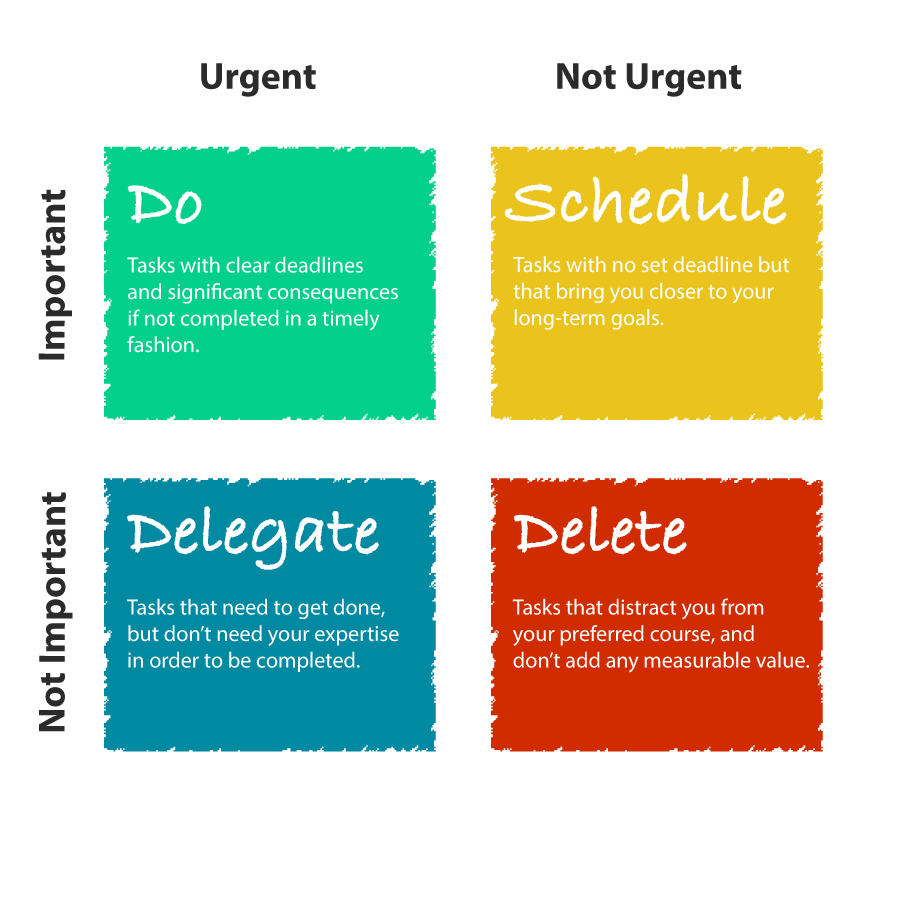Time to Revisit Time Management for School Leaders
Welcome back to the new year and the second semester of the school year. I trust you were able to enjoy family, rest, and eat way too much food that wasn’t considered “good for you.” Regardless, you are back at work, and the demands on your time have ramped back up to that level of craziness you call just another day at school. Besides the usual tasks that present themselves at the beginning of a semester, you are also dealing with another surge of COVID, which drains the precious time you have to spend. No magic will add minutes to the bell schedule, but there are a few tried and true time management tips worth remembering. Time to revisit!
Make a to-do list and prioritize it.
Make a monthly, weekly, and daily list of projects and tasks that need to be completed. Be reasonable about the amount of time it will take to complete each task. Once you have developed the list, prioritize your tasks using the Eisenhower Matrix below. This framework will help you to rank your tasks based on importance and urgency. Prioritizing keeps you from focusing on work that is pressing but not important. Dropping everything to deal with the latest urgent issue can become an excuse not to tackle important work that will have meaningful results for your school. Don’t forget to physically check off each completed task and bathe in the satisfaction it brings.

Delegate.
If someone can do a task 80 percent as good as you, invest time in that person and empower them to complete the task. You are growing a team. Do you know which of your teachers aspire to be school administrators? Providing these teachers with opportunities and experiences makes you a mentor, not a slacker. Delegating a task that plays to a team member’s strength is a sign of recognition and creates a culture of engagement.
Delegating tasks to technology will also save you time. Set calendar reminders and use task management software and apps.
Get organized.
Use that electronic calendar to mark deadlines, project tasks, and work time for yourself. Give your secretary access to your calendar. They are amazingly good at protecting your time and fending off distractions if they know the schedule and priorities you have set. Let technology automate your time. Use filters for your email inbox, use apps to manage projects and streamline your social media accounts, and utilize a central hub for your file sharing and meeting notes.
One thing at a time.
Do you pride yourself on being able to multitask? Before you celebrate that supposed skill, know that focusing on multiple things at once decreases your ability to concentrate on the specifics of any of them. Directing your attention to one thing at a time will help you to complete things more quickly and participate more fully. Your absolute attention prevents you from having to start and restart. Attempting to do multiple things at once is a time killer, not a time saver.
Close your door.
How many times has a teacher leaned against your open door and said, “I know you’re busy, but I just need to ask you…?” Most people think twice before knocking on a closed door. The occasional closed door says, “I’m working,” not “I don’t want to talk to you.” It is okay to get some of your administrative work done during the school day.
Set time limits for prioritized tasks.
Decide in advance how much time you have for each of your tasks. Knowing this will push you to concentrate fully and accomplish more. Working with a time deadline is a motivator. Make sure to allocate a reasonable amount of time for the task at hand, and don’t be afraid to break the task into subtasks appropriate for the time you have available.
Attack your most challenging undertakings when you feel the most productive. Are you an early morning person? Are you a zombie until mid-morning? Do you need a nap around 2 in the afternoon? Use your high-energy times for more taxing jobs and save more simple tasks for the part of the day that finds you the most sluggish.
When your task is gigantic, break it into smaller subtasks. Thinking you have four or more hours to devote to a project is not realistic in the normal school day. Chunking the project into 1-to-2-hour work sessions until completion will keep you motivated and moving to completion.
Learn when to say no.
Before agreeing to bring on your favorite teacher’s new project or the PTA president’s great idea for the next money maker, you need to slow down and decide if the appropriate decision should be no. Before answering, ask yourself if the request meets the mission and vision of the school. Does it align with the goals of your school improvement plan? Time is finite, and you must spend it where it counts.
Distractions be gone.
Make a list of the things that persistently interrupt your workflow. Analyze each of them and make a plan to eliminate or reduce their effects. There is a way to limit that chatty teacher’s 10-minute personal story each morning or the relentless text messages that interfere with your workflow. Realizing how your actions are encouraging this behavior will be a first step in combating it. Prepare an effective anti-distraction strategy by filling in these blanks. If ___________ (the distraction), then ___________ (your reaction). Being ready with a prepared response will save time.
Does the constant ding of the next email in your inbox cause you to stop the task at hand to check the name of the sender? Can you go an hour without checking your inbox or social media accounts? Feeling like you must respond to every digital hit means spending a lot of time on unimportant things. Try setting aside a few minutes each morning and afternoon to answer emails. Establish templates for emails that require the same basic response and always answer emails with statements instead of questions that will invite back-and-forth conversation.
Practice self-care.
Are you the principal who promises themselves a break right after the next crisis is taken care of or the next task is completed? The problem is that you look at the clock and realize you didn’t eat lunch and it is 10 minutes until dismissal. If so, please hear this: Taking breaks increases your productivity. Mental exhaustion, hunger, and dehydration will impair your effectiveness and ability to focus.
Take short, frequent breaks by grabbing a piece of fruit, taking a walk, meditating, doing a chair exercise, closing your eyes. The time you spend on break will add productivity to your day.
Don’t let school life consume your personal life. Take time for family, friends, and hobbies. A resentful principal will burn out fast and make those they are leading miserable.
Cheri Patterson is a trainer and field support representative for the Network for Educator Effectiveness. She joined NEE in 2013 after an extensive career in K-12 education as a teacher, principal, and associate superintendent.
The Network for Educator Effectiveness (NEE) is a simple yet powerful comprehensive system for educator evaluation that helps educators grow, students learn, and schools improve. Developed by preK-12 practitioners and experts at the University of Missouri, NEE brings together classroom observation, student feedback, teacher curriculum planning, and professional development as measures of effectiveness in a secure online portal designed to promote educator growth and development.


